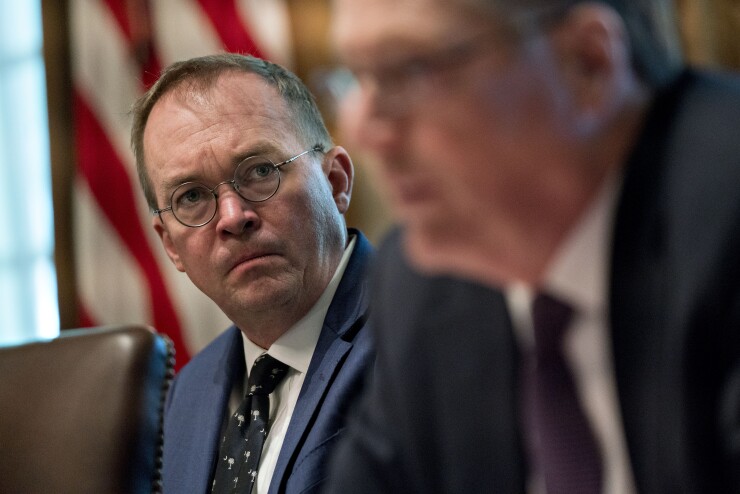In Mick Mulvaney's last significant move as acting director of the Consumer Financial Protection Bureau, the agency drafted a sweeping proposal removing the threat of legal liability for fintech companies that test products benefiting consumers.
The proposed changes would go way beyond the "no-action letter" policy developed by the Obama administration, by creating a "product sandbox" offering firms a legal safe harbor and "exemptive relief" from supervisory and enforcement actions.
The prior 2016 policy finalized by former CFPB Director Richard Cordray was considered a disappointment; only one company was granted a no-action letter. The latest draft proposal, which the agency did not announce but was circulating on Tuesday, said the CFPB is trying to take steps to encourage more innovative companies to participate.

"As noted, the Bureau has provided only one No-Action Letter under the 2016 Policy. The Bureau believes this strongly suggests that both the process required to obtain a No-Action Letter and the relief available under the 2016 Policy have not provided firms with sufficient," the proposal said.
Yet the fate of the proposal — which drew sharp criticism from congressional Democrats and consumer advocates — is now in the hands of Kathy Kraninger, the Trump appointee chosen to run the CFPB on a full-time basis. She was
Under the proposal, the agency would seek to make clearer the benefits of obtaining a no-action letter.
Once a no-action letter is granted, “the bureau will not make supervisory findings or bring a supervisory or enforcement action against the recipient,” the draft said.
To entice firms, the CFPB said it will expand the types of statutory and regulatory relief available, specify procedures for granting extensions of that relief, coordinate with other regulators that have sandbox programs and streamline the application process.
The CFPB's proposed policy was filed Monday and signed by Mulvaney. The policy is expected to be published soon in the Federal Register. The agency signaled its intention to be more accommodating to fintech firms in September when it proposed the creation of a "disclosure sandbox" to encourage innovation in consumer disclosures
But the plan released this week drew immediate criticism.
“I am very concerned by the Consumer Bureau proposal, issued in the last days of Mick Mulvaney’s leadership, to significantly loosen its 'no-action letter' policy in a way that could let bad actors that abuse consumers off the hook entirely from enforcement action by the agency," said Rep. Maxine Waters, D-Calif., the likely incoming chair of the House Financial Services Committee, in a statement. "This is yet another step to weaken the Consumer Bureau and curtail its enforcement tools."
Few companies applied to take advantage of the 2016 policy largely because the firms wanted more regulatory relief.
Under the new proposal, the CFPB intends to have no-action letters signed by the assistant director of the bureau's Office of Innovation or another member of that office.
“The Bureau was urged to provide types of relief that are legally binding on the bureau as well as other parties,” the CFPB proposal said.
The bureau said its review of applications will be focused “on the quality and persuasiveness of the application, with particular emphasis on the potential benefits of the product or service in question for consumers, the extent to which the applicant identifies and controls for potential risks to consumers, and the extent to which no-action relief is needed.”
The CFPB said it also is reassessing data-sharing requirements and time-period limitations for no-action letters. The 2016 policy required applicants commit to sharing data.
“No such data sharing would be expected” under the proposed policy, the CFPB said.
The CFPB also wants applicants to identify the statutory or regulatory provisions from which they are seeking relief, including an identification “of the potential uncertainty, ambiguity or barrier that such relief would address.”
The CFPB will allow applicants to request confidential treatment under the Freedom of Information Act.
The Product Sandbox concept would provide regulatory relief to companies for a limited period, typically two years.
The CFPB may grant provisional admission to the sandbox even if a trade association, service provider or other third-party applicant is unable to submit a complete application, the agency said.





